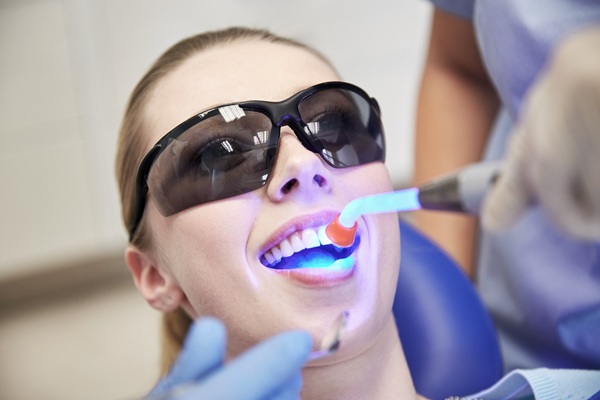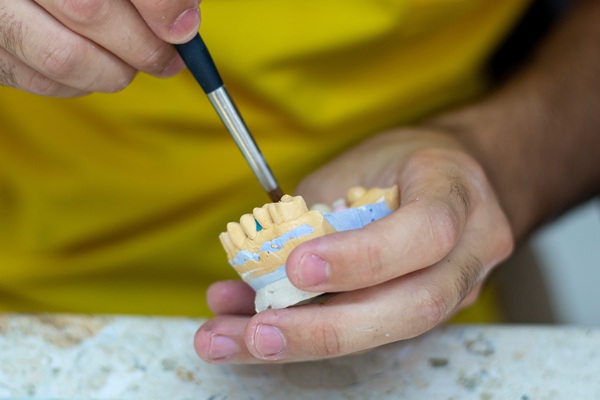How Does Dental Oral Appliance Therapy Treat Sleep Apnea?

Wondering how oral appliances can help treat sleep apnea? Oral appliance therapy tends to be the initial treatment when someone is diagnosed with this serious sleeping disorder. Since there are different types of oral appliances, it is essential to choose the right kind.
Dental sleep apnea treatment
Dental treatment is a popular way to address sleep apnea, as dentists are qualified to diagnose and treat the condition. The main reason why sleep apnea treatment from a dental professional is so popular is that oral appliance therapy is a non-invasive option. Other treatment options include taking medications, using a CPAP machine, undergoing certain medical procedures, and undergoing surgery. However, oral appliances are easy to use, pain-free, and can do wonders for those suffering from sleep apnea.
According to WebMD, dental devices can help keep the airway open while sleeping, as dentists with special expertise in treating sleep apnea can custom-design them.
How dental oral appliance therapy helps sleep apnea patients
The information below explains how oral appliance therapy works to help those diagnosed with this serious sleeping disorder. The overall goal is to keep the patient's airways open while sleeping, allowing them to breathe more easily. This is why oral appliances focus on preventing the jaw and tongue from blocking one's airway.
It keeps the jaw in a forward position
Dental oral appliance therapy helps keep one's jaw in a forward position. This allows the jaw to be positioned in a way that supports a more open airway, allowing those diagnosed with sleep apnea to breathe more easily. The focus is on repositioning the lower jaw so it somewhat protrudes past its regular position, allowing for a more open airway. This type of oral appliance therapy uses mandibular repositioning appliances, which are custom-made for every patient.
It keeps the tongue in the front part of the mouth
Oral appliances also help keep a patient's tongue in the front of their mouth. When the tongue is pulled more to the front part of the mouth, it prevents it from falling into the back part of the mouth, which can block the airway, thus resulting in sleep apnea. Oral appliances that focus on keeping the tongue in the front of a patient's mouth often include using a mandibular repositioning appliance, which also focuses on keeping the jaw in a forward position. Another option is using a tongue retaining device, which only focuses on positioning the tongue.
To conclude
Now that it is understood that oral appliance therapy can help treat sleep apnea, those diagnosed with this serious disorder can take the next step. Since there are a few different oral appliance options, choosing the right one helps ensure sleep apnea sufferers can get the relief they seek. To receive professional guidance and make the right choice, a consultation appointment is necessary.
Are you considering Sleep apnea treatment in the Whittier area? Get more information at https://www.advanceddentalcenter.org.
Check out what others are saying about our dental services on Yelp: Do I Have Sleep Apnea in Whittier, CA.
Related Posts
Looking for a general dentist who offers laser dentistry services? This advanced dental treatment option is growing in popularity every day, as it offers various benefits that are not available using other treatment options. For example, according to the American Dental Association, lasers are used to reshape gums and remove bacteria during root canal procedures.A…
Having a full mouth reconstruction is a highly involved process. Whether you need one due to severe decay or infections, after suffering a dental trauma, or an issue you were born with, this procedure can help restore the full function and appearance of your smile. After a full mouth reconstruction, there are some helpful ways…
Understanding how Invisalign works is the first thing you must do when considering this popular teeth straightening option. You will undergo an initial evaluation performed by a dental professional, who will then assign you a certain number of custom-made aligner sets, which need to be switched out every two weeks. After using the last set…
Without promptly getting a tooth fillings for a cavity, it can lead to other serious oral health issues, including tooth abscesses and tooth loss. Despite improvements in dental hygiene and oral care, tooth decay continues to be a major issue for children and adults alike. Therefore, it is necessary to visit the dentist regularly so…


